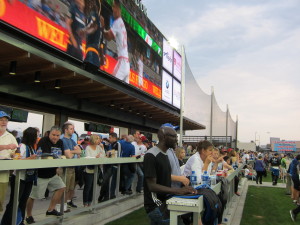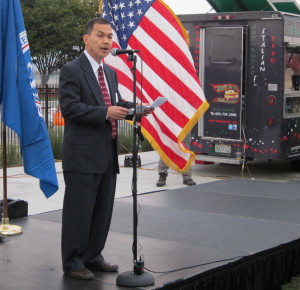By Sharon Simonson

SAN JOSE—Balmy breezes extended pleasant welcome to ten newly pledged U.S. citizens in the hour before the evening start of the soccer game at San Jose’s new Avaya Stadium.
The city’s new Office of Immigrant Affairs and the U.S. Citizenship and Immigration Services had arranged a special naturalization ceremony at the 18,000-seat open-air landmark. The city’s long-time soccer team, the Earthquakes, faced the Seattle Sounders Football Club. The game, 1-1, was a draw. The new citizens were invited to stay for the match after taking the oath of allegiance, including on-field recognition at halftime.
“Thanks to the Earthquakes and USCIS for making us feel special,” 42-year-old Dhiraj Bora, a native of Uttarakhand state in India, said before ceremonies began.![]()
Dressed in a dark sports coat, jeans and tan loafers, Bora has lived in San Jose for fifteen years. He and his wife are taking American citizenship. Becoming a U.S. citizen is “part of the American dream. This is something we will remember for a long time,” he says, motioning to his eight- and five-year-old sons, both already U.S. citizens. “They play soccer, and I used to play.”

The event launches San Jose’s Cities for Citizenship initiative, a national effort by eighteen cities including San Francisco to help more than eight million immigrants living legally in the United States to become U.S. citizens. Citizenship is an “economic asset,” the group contends. It aids financial security and can lift personal earnings by more than 10 percent a year. Thirty-eight percent of San Jose’s population is foreign-born—nearly 400,000 people. That’s more than twice the preponderance of immigrants nationwide. About half of San Jose’s immigrant population has become U.S. citizens, the same rate nationally.
Two USCIS officials in coats and ties stand behind a rectangular folding table up-classed with a long black cloth. (The Earthquakes’ colors are black and blue.) The table sits at the quiet end of a wide concrete walkway that stretches the stadium’s length. They are completing the federal immigration process for the citizen-applicants. USCIS San Jose Field Office District Director John Kramar, dressed in a tan summer suit, blue dress shirt and brown leather dress shoes, stands nearby. He will administer the oath.
The to-be citizens form a short cue in front of the table. Soon paperwork is done, and Zulma Maciel, the head of San Jose’s Immigrant Affairs Office, shepherds the group to a rectangle of lush grass with four large round tables—also covered with long black cloths—and chairs.
Earthquakes President Dave Kaval arrives. He and East San Jose City Councilwoman Magdalena Carrasco stand together to one side.
“Thank you for doing this,” she tells him.
“We are really happy to do it,” Kaval replies.
Nothing could be more fitting than for a stadium that houses an international sport to host a naturalization ceremony, he explains. “We plan on having more. We think it would make a great thing to have as a hallmark of this venue.”![]()
“Maybe someday we can have a thousand people out here,” Kaval says a moment later as he and the councilwoman begin walking down the long concrete walk to the stadium’s main entrance. “It’s an international global sport,” he says again. The citizens-to-be, family and friends stream behind.
A small low wooden stage, painted black, has been built at the end of the stadium closest to Mineta San Jose International Airport and the new $82 million private aircraft hangar and passenger terminal used by the Google company founders, including Russian immigrant Sergey Brin. Norman Y. Mineta, a former San Jose mayor and congressman, is the son of Japanese immigrants.
Dozens of fans sit in groups on another lush grass lawn in front of the stage. Some picnic. Enormous electronic screens flash footage of previous Earthquakes games. The smell of cooking meat from a line of mobile food trucks scents the air. Hundreds of people stand around a long bar.

Newly elected District 4 San Jose City Councilman Manh Nguyen, a Vietnamese refugee, walks to a microphone on the stage. More than half of the people who live in his North San Jose district were born outside the United States, he says. “I, too, was once a stranger in this land, fleeing tyranny in my native Vietnam. I stood where you stand today getting ready to take the oath of citizenship in the most awesome country on earth.”
“We all have a duty to make our community a better place for our children and neighbors, and to continue to welcome new immigrants,” he says.
The to-be citizens file on stage and together take the oath, then 1970s Earthquakes star Manuel “Mani” Hernandez, a naturalized U.S. citizen born in Spain, leads everyone in the pledge of allegiance.
(Photos by Sharon Simonson)